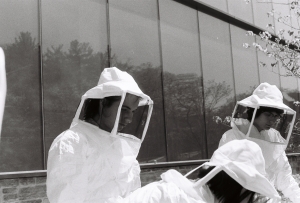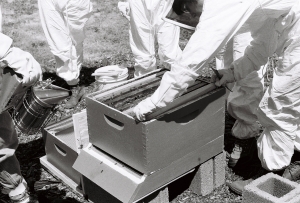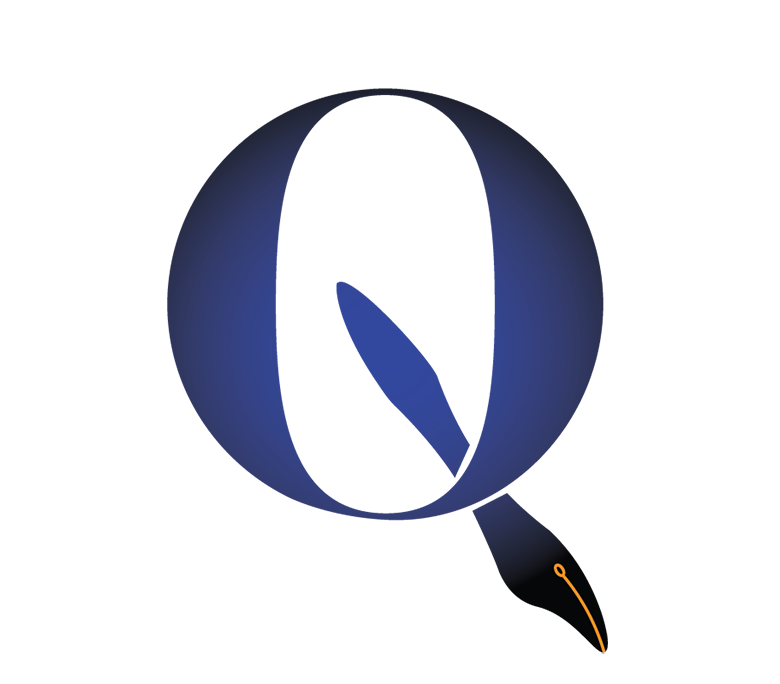
It’s not every day you see a swarm of bodies, swaddled in what look to be white fencing suits, huddled outside your campus library. These bodies move quietly, slowly; thick gloves cover their hands and large screened masks hide their faces like fencers prepared to compete. But they aren’t fencers, they’re beekeepers. Their gloved hands work delicately to inspect their hives. Clumps of honeycomb stick to the frames of the hive boxes where masses of bees swirl. The beekeepers lift these frames out of the decoratively blue and yellow painted boxes for a clear inspection of the hive’s health.
This is Goucher College’s Beekeeping Club. Co-presidents Olivia Baud and Virginia Turpin started the club in 2015 with the help of English faculty member, Marjorie Pryse. “We have been very lucky because the administration is very supportive of us and allows us to have them [the bees]. Not all colleges are down with bees,” Turpin explained.
The club started off this academic year strong with its first ever honey extraction. The campus was abuzz with the news as honey-craving students, staff, and faculty members reached out to get their hands on a jar. “They delivered the first jars to President Bowen, Vice President Coker, Professor Kicklighter, and Matt Harmin – all of whom had been very supportive of the club in one way or another,” Pryse explained.
The club currently has four hives. At the beginning of this past summer, they added special honey storage boxes, called honey supers, to the two healthiest hives that would be most likely to produce an excess of honey. The excess honey would be stored in the honey super, which could then be removed from the hive box to extract the honey while still leaving enough for the hive to survive. During an inspection in late summer, the club leaders determined that there was enough honey collected in one honey super for an extraction to take place.
“So what we do is we take out the frames with honey. We take a really big knife – looks like a butter knife – and we cut the top of the comb to let the honey flow out,” Fiona Rutgers, the club’s treasurer, explained. “We then put it in an extractor, which is like a centrifuge that can fit frames, and we run that which lets the honey flow out, which we collect at the bottom of the extractor. We put the honey through a filter, and voila! The finished product!”
The extraction took place at Marjorie’s house, about fifteen minutes away from campus. The honey super, which is separate from the rest of the hive containing larvae, was removed from the hive and transported to Marjorie’s garage without disturbing or transporting any bees. The extraction needed to take place off campus due to the current campus construction that limits the calm and spacious atmosphere necessary for an extraction. The club leaders, along with one active club member, were able to join Marjorie for the extraction. The process was live-streamed in a Facebook video for the rest of the club members and Goucher’s community to experience.
“We did the extraction, and that was very exciting because that was kind of the goal, the objective Virginia and I had from the start.” Baud said. “It was like, if we get to do an extraction, that will mean we have succeeded in some ways in establishing and maintaining this club. So that was a really momentous event for us.”
Baud, Turpin, and Pryse first bonded over their interest in beekeeping in the fall of 2015. “One of my objectives, coming into Goucher, was actually starting a beekeeping club.” Baud explains, “It was my sophomore or junior year of high school that I read a book by Sue Monk Kidd called The Secret Life of Bees. And the way it portrayed beekeeping and bees in the book really enchanted me.” Her interest connected with Turpin’s when they met in a biology class at Goucher. Their biology professor, Dr. Cynthia Kicklighter, then got them in touch with Marjorie Pryse.
“The Club…benefits from an energetic board of officers. They have generated significant response among students, always ‘sell out’ hive inspection opportunities, and have been very creative in expanding the kinds of activities the Club generates for its members.” Pryse said.
Pryse, Baud, and Turpin spent the 2015-2016 academic year meeting with campus members from Facilities, Public Safety, and the Office of Finance. They needed to decide where to place the hives on campus. “We wanted a site that would both benefit the bees and also – even more importantly – protect students and the general public,” Pryse explained. Furthermore, the club needed to find a space that could provide ample sun; access to forage, which consists of plants and wildflowers that produce pollen and nectar; and proximity to water. “We eventually chose the current site-outside the wall of the Athenaeum that faces the rain garden and loop road- because it met all our requirements. In addition, the apiary stands close to the Co-op Garden, and it is ideal to have synergy between bees and vegetable gardens.”
By spring 2016, the first two hives were established and the Beekeeping Club gained momentum. “We had an event with club members…we wanted to make it a kind of Goucher pride type of event so we painted the boxes blue and yellow.” Baud said. That first semester the club had over 80 people signed up for its email list, and a growing number of students wanting to take part in hive inspections.
Hive inspections are limited by the amount of protective gear the club has. “We used to have only six suits. But we just got some new equipment!” Baud explained. “We base it [hive inspections] around the protective equipment because we absolutely cannot let people go in without some sort of protection. That’s just legally smart to do that.” Each member of an inspection needs to be completely covered with a suit, gloves, and a veil. There are even elastic bands that tighten around the suit’s pant legs to securely protect the entire body.
Inspections are done every two weeks or so, depending on the season. The hives are largely left alone in the winter months to avoid disturbing the bees in the cold weather. When inspections do take place, Baud explained, “the first thing you want to look for is disease, and usually that’s pretty noticeable.” The beekeepers also look at general hive wellbeing involving the larvae and honey production.

Turpin said, “We do need at least one person with some amount of expert knowledge to lead the sessions. For us, that’s Marjorie Pryse. It would be very hard to do this without her help.”
Baud explained, “Marjorie, she’s so modest…but she’s been a huge help for the club. And in all honesty I don’t know if we would’ve come this far if it weren’t for her support.”
Pryse became a beekeeper before she came to Goucher in Fall 2015. “I kept bees in Ithaca, New York, for about six years under the mentorship of a local master beekeeper and working with an area beekeeping club.” From her past experiences, Pryse was able to provide some of the preliminary equipment when the club first started at Goucher, and furthermore has continued to offer her knowledge and guidance to the club members.
“I have never before had as much fun keeping bees as I do now, keeping bees with student beekeepers. It is such a delight to watch the Club introduce newbies to bees and to watch the more experienced members become increasingly comfortable and knowledgeable working with these insects that so many people unfortunately have learned to fear,” Pryse said.
Goucher’s Beekeeping Club is a member of the Maryland Beekeeper’s Association, through which the club was able to purchase some of its hives and connect to a larger beekeeping community. According to Bee Culture Magazine, most colleges and universities that keep bees tend to be larger state schools where the bees are kept in various entomology departments or research labs. The University of Maryland’s Department of Entomology has a Honey Bee Lab, through which they can conduct apiculture research.
Baud explained, “I think there is something to be said about how disconnected we are from nature and from things like honeybees because we aren’t used to being exposed them in our present, modern world.” Goucher’s campus is unique with its spacious greenery. It also has a community of administrators, staff, and students who support, or at the very least tolerate, beekeepers promoting awareness of bees by actually maintaining hives on campus. With the recent honey extraction, the community has even more of a reason to support the bees and their dedicated keepers.
“The Club…extracted more than 20 pounds of honey,” Pryse said. 20 pounds didn’t meet the demand on campus, so club leaders designed a raffle system for the distribution process.
“A big concern for the club was finding a way to distribute honey in the most equitable way,” Rutgers said. “The raffle was a way for us to give everyone a chance to buy.” Community members had the opportunity to email the club to enter their names into the raffle. From there, the club used an algorithmic-based website to randomly select the winners. There were 22 jars in total that were sold through this process, at ten dollars a jar.
Before the jars were ready for distribution, labels had to be made. “We decided to open up a label-drawing contest and decided that the winner would receive a jar of honey,” Baud said. She, Turpin, and Rutgers all privately ranked their top three choices of the submissions they received. Luckily, they all agreed on their final choice, a design created by student, Erin Ertunga. The honey distribution just took place this week.
With the club’s success over its first two years, Baud has long-term visions for the club’s role on campus, including providing awareness to campus members that honeybees should not be feared. “My hope is that people who don’t feel comfortable around bees, that we’ll be able to reach out to those people, and they don’t even have to participate, but get them to witness a hive inspection. Because I think even just getting to witness one can really help dissipate the irrational fear of honeybees.”
